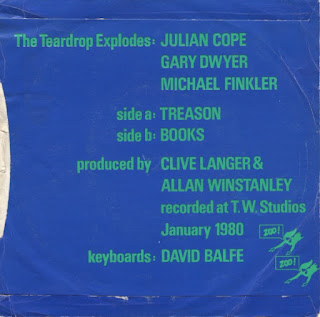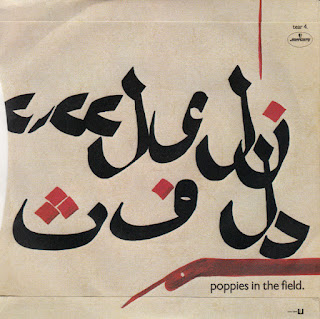Read It In Books
Version Zero - "Zoology" compilation album, recorded 1978 released 2004
Ian McCulloch - vocals
Paul Simpson - organ
Julian Cope - guitar
Dave Pickett - drums
Version One - Zoo Records CAGE 008 - recorded late 1979, released March 1980
Julian Cope - vocals, bass
Mick Finkler - guitar
Gary Dwyer - drums
David Balfe - keyboards *
Version Two - "Kilimanjaro" album, recorded Summer 1980, released October 1980
Julian Cope - vocals, bass
David Balfe - organ
Alan Gill - guitar
Gary Dwyer - drums
Hurricane Smith, Ray Martinez - Trumpets
Written by Cope / McCulloch
"Uh?"
In terms of daft band names it's pretty high up the list. "Uh?" was apparently the catchphrase of the band's drummer Dave Pickett. Maybe he just didn't understand what he was being asked. (Make your own drummer joke here). Uh? was the band that somehow metamorphosed into A Shallow Madness which then became The Teardrop Explodes with a little tweaking. But in early 1978 it was enough to be a band, even one with a daft name like Uh? Why am I placing so much emphasis on this band? Because Uh? produced the only song written together by Ian McCulloch and Julian Cope, a song both would reinterpret a number of times.
"Read it in books" (sometimes titled "Books") can trace it's lineage back to "Stepping Out" by the Fall. It's another example of an artist trying to reach for something, falling short but still creating a different kind of magic. While "Stepping out" hangs on its chords, Cope makes it into a two chord clanger, with an ascending descending bassline. The band jammed on this riff, McCulloch took a tape home and came back with a vocal melody and lyric at the next rehearsal. The recording made in early 1978 released on "Zoology" may list The Teardrop Explodes on the track listing but Cope has the good grace in the sleeve notes to say it is A Shallow Madness. Everything is there in embryonic form - McCulloch's vocal and lyric is there, the instruments are vaguely in tune, though the drums sound like cardboard boxes - the song is there behind the tape hiss and wow and flutter.
"Read it in books" would be part of the set for the Teardrop Explodes debut gig in November 1978 and would remain in the band's live set for a long long time. On a Feb 79 gig recording Cope introduces the song as being written by "the most important man in the room" then makes a snide remark about McCulloch. And so it would go on. The Bunnymen recorded "Books" for the b side of their debut single released in May '79 so Cope changed his intro accordingly - along the lines of "Here's a song by Echo and the Bunnymen, but our version is better!" Listening to early shows by the Teardrops, "Books" stands out as one of the few songs based around chords rather than single note guitar or organ lines. One wonders why it took so long to record it. On the other hand, knowing that the a side of the single was written about his jealousy of McCulloch meant Cope took some perverse pleasure in having McCulloch co-write it's b side.
The b side version of "Books" would be quite a surprise to anyone who only knew the "Kilimanjaro" version ** It starts with Finkler's choppy two chord riff before the drums then bass and organ hit a repeated note, and then the song is rolling, a mid tempo groove. It is still a typical early Teardrops song - the repetition of the riff and one note vocal melody in the verse leading to a more melodic chorus (listen to Cope's high octave jumping bass, he's a better player than he's ever let on) and a post-chorus crescendo. It's a great little tune, well arranged - that final piano note on the fade is possibly a nod to either "A day in the life" or "Cheese and onions" and it makes for a very worthy b-side.
As with a lot of the Teardrops' early material it was rerecorded for their debut album. If there is a recording from the Spring sessions with Mick Finkler on guitar then it hasn't turned up yet, but once Finkler had been replaced by Alan Gill the band returned to Rockfield to finish the album. "Read it in books" is one of two songs produced by Mike Howlett for the album rather than The Chameleons (Bill Drummond and Dave Balfe) and his studio experience shines through on this rearrangement. It sounds like a great pop single, even though it's just an album track. Oddly it's the only song on the album which isn't included on the lyric insert on both the original issue and the zebra edition a year later.
Starting with a Northern Soul drumbeat and a yelp from Cope, the song rockets along on the new drumbeat, Gill's slightly overdriven guitar chords and Balfe's organ melody played in unison with those triumphant trumpets. Cope gives one of his best vocal performances on the album, full of passion and fire, and the whole band play on the edge of their abilities. The arrangement allows for a drop down and build in the third verse, highlighting Gill's feedbacking guitar before the final chorus sees a sea of overdubbed Copes shouting "No! No! No!" at each other before the trumpets bring the song to a close alongside an exhausted drum roll from Dwyer. It's a fantastic re-arrangement and almost a dry run for their second Mercury single which would be written and recorded a few months after this performance.
Maybe the reason the whole band put so much into the second version of "Read it in books" was because Cope wanted to reclaim the song in his image. By the time the Teardrops were recording it for "Kilimanjaro", the Bunnymen had recorded it three times - twice on record and once for a Peel session. As mentioned already it had appeared on the b side of their debut single in May 1979 where both Paul Simpson and Dave Balfe had contributed handclaps and backing vocals and a very similar version was taped for their debut Peel session. This arrangement is similar to the first Teardrops recording, emphasising the two chord riff, but McCulloch changes a lot of the lyrics as he has every right to do. (It's interesting to note that on the version on "Zoology" McCulloch mainly sings the same words as Cope's versions). The second studio recording of "Books" wasn't included on the Bunnymen's debut album "Crocodiles" but was included on a free single with initial copies of the album ***. The new Bunnymen version wasn't reliant on Echo their drum machine so they slowed the song down, based on Les Pattinson's bouncing bassline, Pete De Freitas' rolling drum patterns and some very angular guitar chords. It's more made it more menacing with McCulloch sing-whispering the lyrics (expanded to five verses) closing with a whispered "That's all" as a final guitar chord clangs. If this was the Bunnymen's definitive take on the song then the Teardrops version eats it for breakfast.
Of course as both bands recorded the song and both singers contributed to and changed the lyrics it could be said that they are singing to each other. The first verse on both versions is basically the same - "You said you couldn't find anyone to love you" - and the same chorus. The Bunnymen then veer off into their own second verse and a different lyric for the chorus - "Once I liked lying, twice I liked laughter" before the verses coalesce again. The Bunnymen sing
"I said you gotta stop
Chasing rainbows
You said I'm just
Staying up
And anyway I like it
When the rain goes"
To which the Teardrops sing back
"You said I tend to spend my life
Chasing rainbows
I said that's a cliché phrase
And anyway I like it
When the rain goes".
Ouch.
For the final verse they veer off in different directions again. Mac sings about a loving fuss or something while Cope snarls about "what did you do for me?" (one of the most passionate vocals on the album) before changing the chorus to a lyric on love getting stronger then quoting "Five to one" by the Doors ("May take a week but it won't take longer"). Game set and match to Cope, I'd say. I suppose it helps recording the song in response to the Bunnymen's version.
As expected for a song which was in the Teardrops first setlist, "Books" was played a lot live. It truly reached its peak during the summer 1981 UK tour where it was usually placed at the start of the set, and what a fantastic way to open a concert! That brass, the clanging guitar, you can picture Alfie bouncing around on bass... The last time it was played by the Teardrops was at the Hacienda in Manchester in 1982, one of the last gigs before they became a trio. That wasn't the last time it would be played by Cope - it was a regular in his early live sets (I saw him play it at my first Cope gig in April 87) and he recorded it again for the b side of the "Charlotte Anne" single in 1988, changing the lyrics and swapping the order of the lines in the chorus. According to Setlist.FM the Bunnymen haven't played "Books" since 1984 and Cope hasn't played it since 2006. They both have a lot more songs to sing and learn these days. But "Books" in all its guises is a fascinating snapshot of two egos working briefly and brilliantly in harmony.
* Note in the Zoo single sleeve the Teardrop Explodes are listed as Cope, Finkler and Dwyer while David Balfe is listed separately as "Keyboards" as if he wasn't really a member of the band.
** ie your humble author, who first heard only the intro on a volume of SFX, the music paper on cassette, which had an interview with Cope from Club Zoo. This was my first inkling that the Zoo singles may not be the same versions as on "Kilimanjaro". Oh such sweet innocence.
*** Both sides of the free single were inserted into the middle of the running order of the cassette too, only my cassette had "The Puppet" instead of "Do it clean"...



Copey has played Books live in recent years. In Edinburgh just before the pandemic he acknowledged the debt to Stepping Out.
ReplyDelete